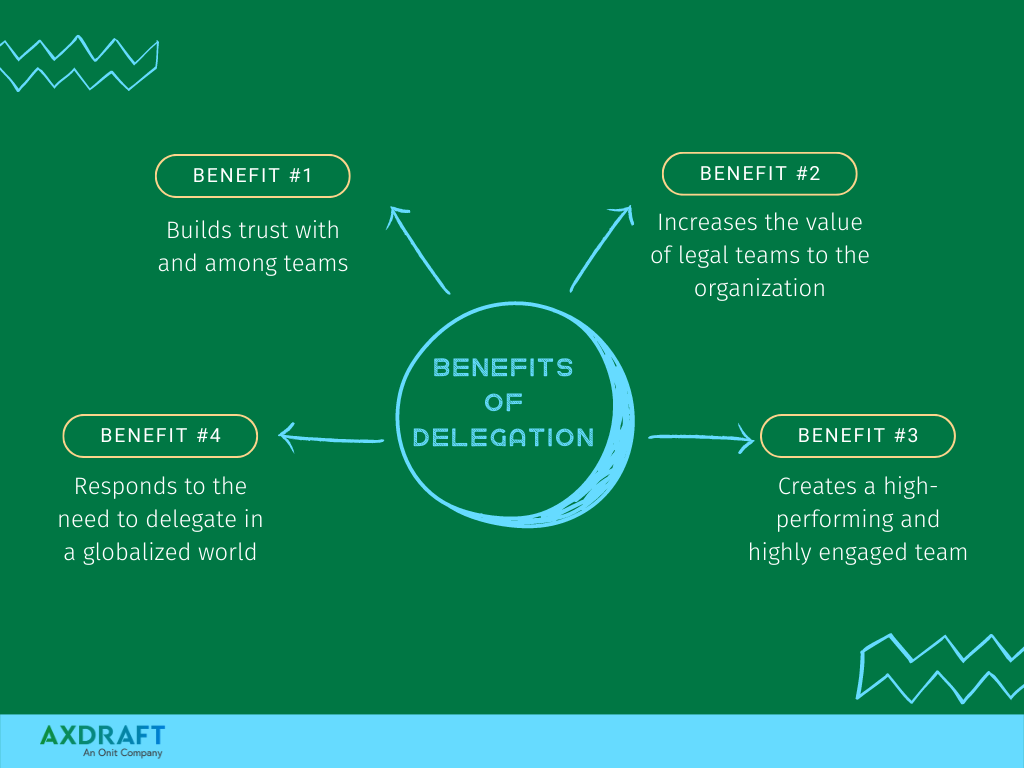Got no time to read? Listen to our blog on the go
In October, AXDRAFT attended ACC, one of the year’s top legal conferences in the United States.
We previously discussed several key insights we gathered at the conference regarding strategic vision building and ethics of AI in legal technology. Today, we’ll be shifting gears to reveal what we learned regarding task delegation.
Learning to Delegate
Delegation isn’t easy. We’re often biased to think that we’re the ones best suited for completing a certain task. This tends to make trusting others difficult.
If you’re a manager, this can be even more challenging. Since managers know a great deal about the details, and they’re potentially the only one who knows everything front-and-back, why should they spend time explaining it when they could just as easily handle it themselves?
Even if the above is true, it’s still important to remember that managers are supposed to manage. And in order to manage, one must delegate.
That being said, even though it’s hard, delegation has several important benefits.

- Builds trust with and among teams: By establishing a culture of trust, this shows that you believe another can accomplish tasks in a satisfactory manner. Not only is this good for the overall team culture, but it’s beneficial for the employee’s self-esteem.
- Increases the value of legal teams to the organization: Delegating tasks has the direct benefit of freeing up time that can then be repurposed for more strategic, high-value work. And since you actually have the time, you’ll be able to achieve much more.
- Creates a high-performing and highly engaged team: By delegating, you’re making better use of your team’s time and ensuring everyone has something meaningful to do. As a whole, they’ll be able to achieve much more.
- Responds to the need to delegate in a globalized world: In today’s environment, teams need to be as flexible as possible to address any unexpected issues that appear. In turn, this allows all team members to improve their skills. In the long run, this works out well for the company.
Myths of Delegation
Many lawyers struggle with delegation, as well as overcoming certain myths. Whether or not they’re deserved, lawyers fall victim to countless stereotypes, such as being sharks, vampires, or money hungry.
Here are a few myths about lawyers and their ability (or inability?) to delegate:
Myth 1: Lawyers are control freaks – This may or may not be true, and it depends primarily on the individual. Even so, there are many who aren’t lawyers who are also control freaks. Air traffic controllers, for instance, can be notoriously controlling (No pun intended… ).
Myth 2: If you want it done right, you have to do it yourself – Again, this may or may not be true, and it also depends on the person. It doesn’t help matters that popular culture and countless films espouse this same idea. When the bad guy’s goons or henchmen fail, the villain always repeats this same adage.
Myth 3: Lawyers work long hours and have no work/life balance – And yet again, this may or may not be true, and (for fear of sounding like a broken record) this depends on the person. Lots of films show lawyers working from zero-dark-thirty to midnight while their marriages and relationships fall apart. Think Jim Carry at the beginning of Liar, Liar.
But even with these myths, lawyers have to triage hundreds of legal issues at the same time. This not only makes retention of talent a huge deal, but it means accessing premier talent can be a major challenge.

Approaches to Delegation
The traditional approach to delegation can be described as “Who’s got the monkey?”
In this approach, a manager assigns a task (i.e. the monkey) to a member of their team. But if the team member becomes stumped and doesn’t know how to proceed, they often send the task back to the manager.
Considering that many teams have multiple people under one manager, and managers have a scarce amount of time (and a multitude of tasks), the manager becomes overwhelmed. Ultimately, as more monkeys get placed on the shoulders of the manager, they become a bottleneck and nothing gets done.
To solve the monkey conundrum, employees should bring the monkey to the manager along with several ideas on how to solve the problem. Ideally, the ideas are presented as options that need simply a yay or nay.
There are a few basic principles regarding how to take care of monkeys (i.e. complete tasks):
- Don’t overwhelm the manager with too many monkeys.
- Meetings are by appointment only.
- Meetings are face-to-face or via call (never email!).
- There should be set deadlines and outcomes.
Taking into account all that goes into caring for monkeys, delegation shouldn’t be seen as a chore. Instead, it should be viewed as an opportunity to develop.
When delegating to a team member, it’s important to consider the member’s individual and growth goals. Although there may be exceptions when the company’s strategic objectives won’t allow it, whenever possible, only tasks that align with the member’s pursuits should be delegated to them.
Who to delegate to?

The first step is to identify what must absolutely be done by Legal (no questions asked). Once all essential responsibilities are defined, the next step is to look for ways to triage and send non-essential tasks to other teams.
This could be delegating standard NDAs or DPAs to sales teams, employment documentation to HR, or finding interns who are willing to do the work in exchange for experience. The right software can even open other avenues for delegation or training colleagues who don’t have a legal background.
For example, AXDRAFT’s QuickDocs platform enables in-house legal teams to delegate standard documents to non-legal teams. This removes the need for legal to involve themselves in routine agreements while permitting non-legal teams to move at their own pace.
Delegation in Remote/Hybrid Scenarios
The Covid-19 pandemic forced businesses to send their employees home to work remotely. As restrictions loosened, cases lessened, and vaccines were released, companies began to slowly switch to a hybrid format where workers occasionally visited the office.
Not everyone was happy though.
According to a survey of 20,000 employees by Microsoft, an overwhelming 87% felt they were more productive when working from home. On the flip side, 85% of managers didn’t believe their employees were performing at peak productivity.
Delegation can potentially address this gap in perception.
By handing people the reins to manage their own work, it shows respect and trust that they can do the job regardless of their location and schedule. It can also decrease productivity paranoia.
Still, delegation without a strategy is a recipe for failure. Here are a couple of actions you should take when delegating work to remote teams:
- Clarify why you want to delegate, as well as what and to whom.
- Answer this question: Do you want to empower your team or focus on strategic work?
- Identify what’s holding you back from delegating, and how to address it.
Why Delegation Fails

Delegation can fail for any number of reasons, but they usually tie back to the manager’s personality and their inability to trust their team.
Emily Morgan, author of Let It Go! How To Finally Master Delegation & Scale Freedom Across Your Organization, sums it up by identifying five distinct personality types: Heroes, Interventionists, Isolationists, Time Optimists, and Dreamers.
Heroes, for example, typically want to save the day and feel like they’re needed. They have the desire to be in control, and they prioritize perfection over progress.
By contrast, isolationists are “too busy doing”. As a result, they act like they’re always out of time and don’t have the freedom to delegate. And while they may know exactly what they could delegate, they don’t practice good communication, which ultimately leaves them stuck having to handle matters themselves.
Learning to Trust the Team
We’ve said it before, and we’ll say it again: “Delegation isn’t easy.”
That’s because it can be challenging to relinquish control of something you know inside and out while also entrusting it to another. But ask yourself this question:
Are you holding back from your team? Or are you holding your team back?
The answer is up to you.
If you feel like you aren’t yet ready to start trusting your team, here are a few steps you can follow:
- Get the right people in the right spot.
- Designate a gatekeeper.
- Make yourself available.
- Get some easy wins.
- Delegate 80% of the work, maintain control of 20%.
- Set clear measures for success.
- Communicate.
Trust won’t suddenly appear overnight, but these steps can start building momentum towards a culture of trust. Easy wins and clear measures of success are key for helping your team build confidence in themselves, while making yourself available and consistently communicating shows that you’re engaged and willing to dedicate the time to see them grow.
Wrapping Up
Delegation is an essential yet underrated skill that managers need on a daily basis. The next time you’re starting to feel overwhelmed by the monkeys on your shoulder, you should ask yourself which ones have to be done by you, and which you can pass off to others.
Unless you’re the only person on your team (which is unlikely if you’re a manager), there’s a 100% chance that there’s something on your dashboard that you can hand to someone else.
Take standardized high-volume, low-value agreements like NDAs.
As a manager, you shouldn’t have to deal with them. Instead, teaching another team how to use contracting software will free up your time for other strategic matters. Try AXDRAFT’s instant demo to see how fast and easy it is to draft a full NDA.